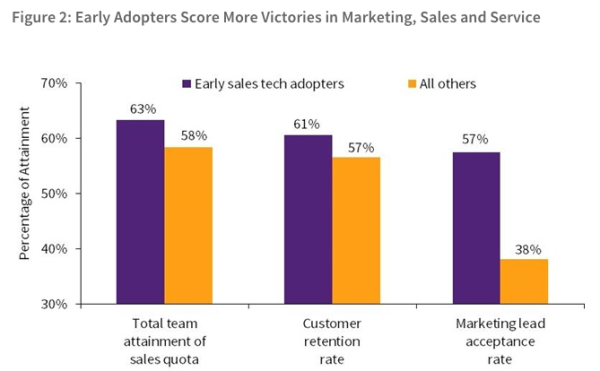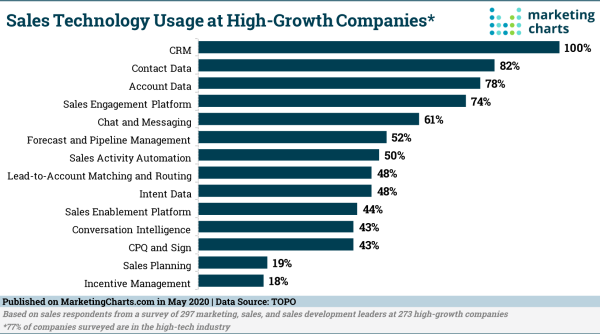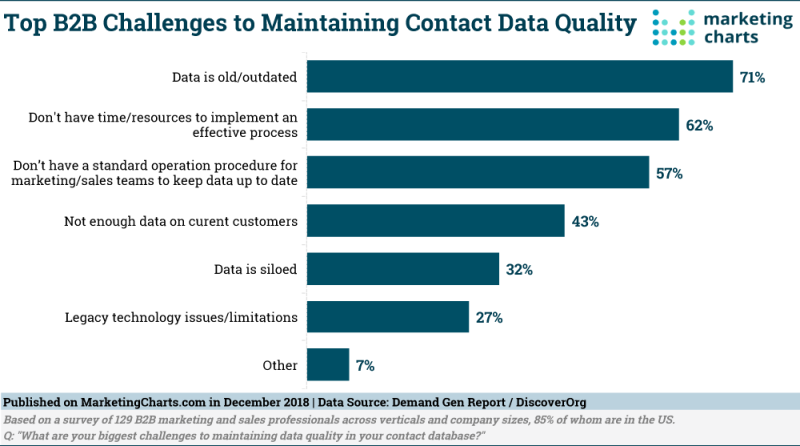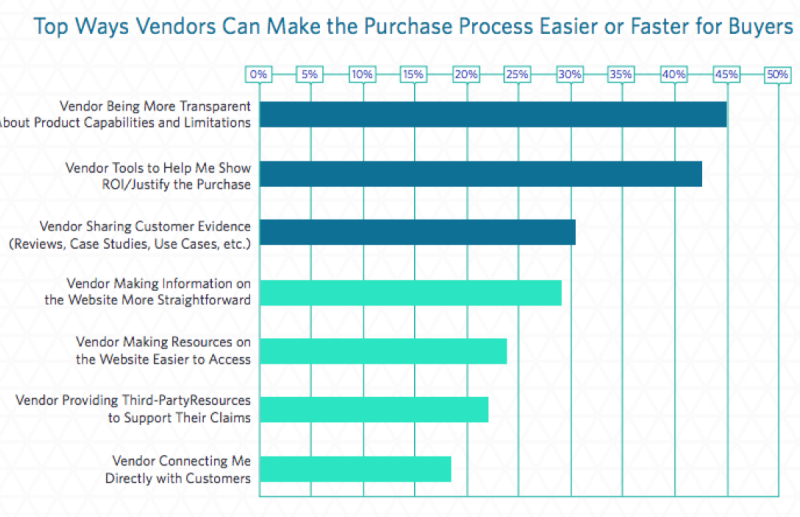How Technology Has Transformed Sales
New technologies have changed the sales sector and the salespeople’s jobs dramatically in recent times. These technological developments will only speed up in the future.
How technology has transformed sales in recent times is a dramatic change from 50 years ago, when a salesperson, for instance, would probably have a lot of trouble adapting to new circumstances and new practices in order to stay competitive.
And these technological developments will only speed up in the future. A salesperson today who would fail to learn new things and stay in touch with technological innovations wouldn’t have to wait 50 years to fall behind – it would probably happen in less than a decade. And this interval of time will be getting shorter and shorter.
All this means that companies will have to modernize and start using sales technology as otherwise their competition will surely do it before them and gain a clear competitive advantage. Moreover, salespeople will have to continuously learn, adapt, as well as modify their methods and approach.
The results of this will be a more efficient selling process and improved bottom lines, while the everyday job of salespeople will be simpler, more streamlined, and freed from some annoying, repetitive tasks that normally take a lot of their time.
So let’s see in more detail how exactly technology has transformed sales and how it will further affect sales activities in the future.
Advanced data analysis makes for well-informed sales strategies
Lately, the crucial driver of changes in the sales sector is access to customer data. Companies and sales reps today have a lot more informed approach to selling thanks to large amounts of this data. A few decades ago, you’d often need to make dozens of cold calls in order to make a single sale, which was a huge time-waster.
This was simply because market research, the way it was done back in the days, wasn’t based on enough solid, reliable info about potential customers, so sales reps often had to make a ton of basically random calls to utterly uninterested parties.
Now, digital tools like CRM software collect accurate, extensive data about customers and prospects from a whole array of different platforms – your website, social media, or third-party vendors. And that’s not all, as CRM platforms will also automatically assign scores to specific leads and prioritize them based on their apparent interest for your company or your product.
This makes selling a whole lot simpler as you can easily choose people and companies to reach out to. There are objective parameters that CRM software use to prioritize leads, such as personal info, browsing activity on your website, or details scraped from social media. In essence, cold calls are getting less and less cold and people are getting fewer and fewer calls from businesses trying to sell them stuff they really don’t care about. So it’s a win-win situation for both parties.
Finally, cross-selling and upselling are made much easier for sales reps as they can accurately time and personalize their follow-ups and special offers.
Social tools and networks are offering a multitude of benefits
Using social media wisely can help you get some more advanced info about potential clients. This is especially important for B2B businesses that normally have fewer leads, fewer customers, higher-value individual sales, larger customer lifetime value, and thus tend to focus strongly on every single potential client.
By analyzing companies’ social accounts or even personal social profiles of their decision-makers or representatives, you can find out many subtle details, pain points, and current problems that a potential customer is facing. In other words, the data collected by the software suggests the most qualified leads to pursue, and an advanced manual social media research will inform your approach and your selling strategy. To maximize your sales performance, you’ll need both.
Also, social networks can be used as a medium to communicate and reach out to prospects. You don’t have to spend the whole afternoon on the golf course anymore in order to sell, as you can pitch your product via conference call in a matter of minutes. In general, communication between businesses and their clients has been highly streamlined thanks to mobile phones (especially with the emergence of smartphones), social media, and digital communication tools.
Ultimately, social media are also a great platform to sell your products. Every social network is basically a new market. So social media help you get vital info about your leads and sell the users your product, all in one place.
Global connectedness has opened new markets
It’s safe to say that the concept of a global village has been almost fully actualized. And a great thing about it is that you have a chance to sell whatever you want to virtually anyone in the village. Thanks to modern technologies, the whole world can be your market.
This is crucial for businesses that sell highly-specialized products and services. Their target market is just a tiny fraction of the entire market, which is pretty inconvenient if your market is local or even national. But a tiny fraction of the global market is not tiny at all and these highly-focused companies can still maintain a sustainable business thanks to this fact. Today, you can reach out to and target consumers across the entire globe with ease and that represents an immense improvement.
Moreover, sales reps’ lives have been made easier as they can pitch and sell to actual qualified leads instead of aimlessly cold-calling local businesses and consumers hoping for a miracle. On the other hand, the accounts they’re targeting are much more culturally diverse and this means they often have to modify their tactics and their game plan to suit different potential clients.
Automation tools are making sales more efficient
We all know that automation of work was literally one of the main engines of the industrial revolution. Whenever a certain job or a whole sector got automated it brought huge changes to the sector, sometimes even turning it upside down. And it’s been like that for centuries.
It’s no different with sales, especially over the course of the last few decades. The applications of automation in sales are countless. Let’s try to mention some of them.
Automation of contact management
Firstly, there’s the automation of data capturing and organization, especially in the field of contact management. Having a business card and using it at networking events is still a nice touch, but it’s merely symbolic. Nobody in their right mind will keep a pile of business cards on their desk and dig through them hopelessly every time they need your number.
Contact management in sales can and should be fully automated as it saves time and minimizes the risk of human error. Sales executives and reps don’t even have to meet a potential client or have any kind of interaction in order to obtain their contact info – digital tools can scrape all this info from different corners of the internet and store it in a unified central database.
Automation of lead nurturing
This process can be followed by automatic lead scoring and prioritization, especially if the prospect had some sort of interaction with your website or other channels. In addition, the software can help you automate work activities in the sales department or even across different departments. With enough info, CRM will also create, systematize, and delegate specific tasks to sales reps, based on an array of objective factors.
It can even go a step further and do the initial outreach or automatically send follow-up messages to users who showed some signs of interest. Of course, you’ll have to set triggers and write these messages in advance yourself, but once you have that set up, CRM software does a whole lot of work that would otherwise take a human sales rep loads of time to finish.
The power of recommendation engines
When the user views a certain product or adds it to the cart, that can be a signal for the software to automatically recommend related products. Recommendation engines are doing a remarkable job for some of the biggest companies in the world, such as Amazon or Netflix, and improve the bottom line of virtually any business that operates online.
Finally, automation tools can do a lot of boring, tedious work that consumes a lot of salespeople’s time. Apart from delegating tasks or sending follow-up mails, they can also schedule appointments, update sales opportunities, calculate sales quotas, and much much more.
New technologies have created a new generation of consumers
It’s important to emphasize that technological improvements are beneficial for consumers as much as they are to companies. They can educate themselves very easily about your product, your industry, and your competition. Sales reps have to reinvent their game constantly in order to be able to sell to this new, knowledgeable, and well-informed generation of consumers.
This generation is much more skeptical towards brands as they get bombarded by all sorts of ads 24/7. Cheap sales tricks don’t work anymore and sales reps need to have an honest, transparent approach and try to build long-term relationships based on actual trust.
Companies have to understand that consumers today can find info about your competition and what they have to offer. In order to explain why their product is better, salespeople have to be very familiar with other businesses and products in their industry. They ought to be ready for all sorts of complex, delicate, and even uncomfortable questions or they’ll lose these potential customers to their competition.
Moreover, consumers today expect highly personalized experiences. A generic, one-size-fits-all approach won’t do the trick. Sales reps have to adapt their strategy to individual prospects more than ever. Luckily, they also have more data about customers than ever at their disposal and they should definitely use this to their advantage.
Better performance analysis helps identify best sales practices
Finally, technology has big implications on sales performance analysis and the adoption of common practices and procedures.
Some advanced tools can track and monitor your overall sales performance in detail, as well as the efficiency of every individual team member. This makes sales reps more accountable, and also points to inefficient practices that need to be changed or upgraded.
Moreover, this helps you identify the best workers and best practices that actually bring results. A thorough analysis will show which methods and approaches work for certain clients or certain sectors. Over time you’ll have more and more useful info of this kind which will enable you to recognize and establish the most effective common procedures.
Discover How SpotlerCRM Can Help
Final thoughts
We can be sure about one thing – there’s no sector where we’ll see less and less technology in the future. And this goes for sales as well. Not using technology in your sales activities is not only unproductive, but also outright silly because tech innovations can improve your business on so many levels and in so many areas.
The wheel won’t start turning backwards. Technology will only bring more business benefits in the years to come and the right time for the companies to invest in it is right now.
Really Simple Systems is now Spotler CRM
The same great technology, a CRM platform that is focused on the needs of B2B marketers, provided by the same great team, at a great price!



